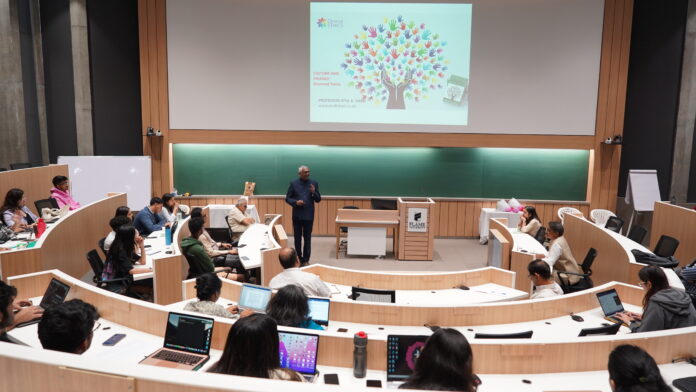The symposium highlighted India’s traditional sustainable financial models, based on indigenous and ethical Dharmic wisdom, as a case study for global sustainable finance
9th January 2023, Pune, India: The symposium on sustainable finance, held at FLAME University on January 6, 2023, was an ode to the traditional financial practices of India that place a strong emphasis on an ethical Dharmic approach to sustainable finance. The Dharmic approach is a true reflection of a sustainable financial paradigm that believes in aligning the financial system with sustainable development.
The one of its kind event was coordinated by Prof. Devendra Kumar Jain, Faculty of Finance, FLAME University. Globally renowned expert advisor, thought leader, writer, educator, and broadcaster, Prof. Atul K. Shah, was the key speaker of the symposium.
A striking highlight of Prof. Shah’s inspiring journey in sustainable finance is his latest book, “Inclusive and Sustainable Finance – Leadership, Ethics and Culture’ published by Routledge and profiled by the BBC World Service. He spoke at the event with excerpts from his book that showcased his pioneering research on how a few Indian business leaders possess rare and indigenous wisdom for providing exemplary guidance to deal with the challenges that come with adopting a sustainable financial model. The book has already received eminent coverage from various media houses for its noteworthy and significant contribution to the concept of India’s sustainable Dharmic wisdom in times of existential crisis. The other panel members of the symposium were Prof. Yugank Goyal, Faculty of Public Policy, FLAME University, and Prof. Anuja Sethiya, Faculty of Finance, FLAME University.
The symposium aimed at educating students on the developing practices and approaches to sustainable finance that have been ingrained and co-existed in the history of the Indian landscape of finance for decades. Traditionally, investors always evaluated performance based on financial measures only, but the idea behind a sustainable approach is widening our perspective on investment with a heavy focus on Environmental, Social, Government (ESG), and Corporate Social Responsibility (CSR).
Before making investments that may be harmful to the environment, financial investors must carefully consider the social consequences of their decisions. The fundamental purpose of India’s sustainable financial system is to serve the economy and wider society by aligning financial decisions with environmental sustainability. The new approach to finance is purpose-oriented, mission-driven, and value-oriented, which is opposite to the traditional role of finance.
A transition to sustainable finance adopts a broader perspective on sustainable development that emphasizes a wide-scale system transformation. The ultimate goal of sustainable finance is a paradigm shift in the roles of financial agents and markets, which need to stop viewing finance’s dominant role as one of profit and shareholder value and identify new directions for the already emerging new sustainable approach.
Speaking on this crucial topic, Prof. Atul K. Shah said, “The critical role of finance in dealing with climate change is dawning upon the world, but what the world needs to inherently recognize is the critical wisdom of how India is helping to create a sustainable planet at large under highly adept leadership and by focusing on ethical Dharmic wisdom.”
He further added, “At the conference in Glasgow, the major topic of debate was finance. With 30 years of in-depth research findings, my book brings a discerning value to the subject of sustainable finance and breaks the ambiguity associated with the subject by demystifying the concept to make it understandable and contributing to bringing about a radical reform that will influence investment decisions at a global level. The current financial crisis can be resolved with a gregarious approach to financial growth that involves thriving in an economy by establishing harmony with the planet without fear and insecurities.”
Also sharing his valuable insights was Prof. Devendra Kumar Jain, who added, “With the ongoing crisis of global warming, the subject of climate or green finance and sustainable finance is of utmost importance and can make a significant impact globally. At FLAME, we support and facilitate these discussions on sustainable finance, which are in line with our vision of pioneering liberal education.”
Climate change is posing a significant threat to humanity, and while there are countless solutions to tackle this existential threat, the solutions to curb it call for billions of dollars of investment in sustainable infrastructure that reverses the catastrophic effects of climate abuse. Keeping these global issues in mind, sustainable finance is the way forward. The real question is whether the private and public sectors will be committed to mobilizing finance and accelerating innovation for continued sustainable change.

